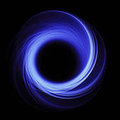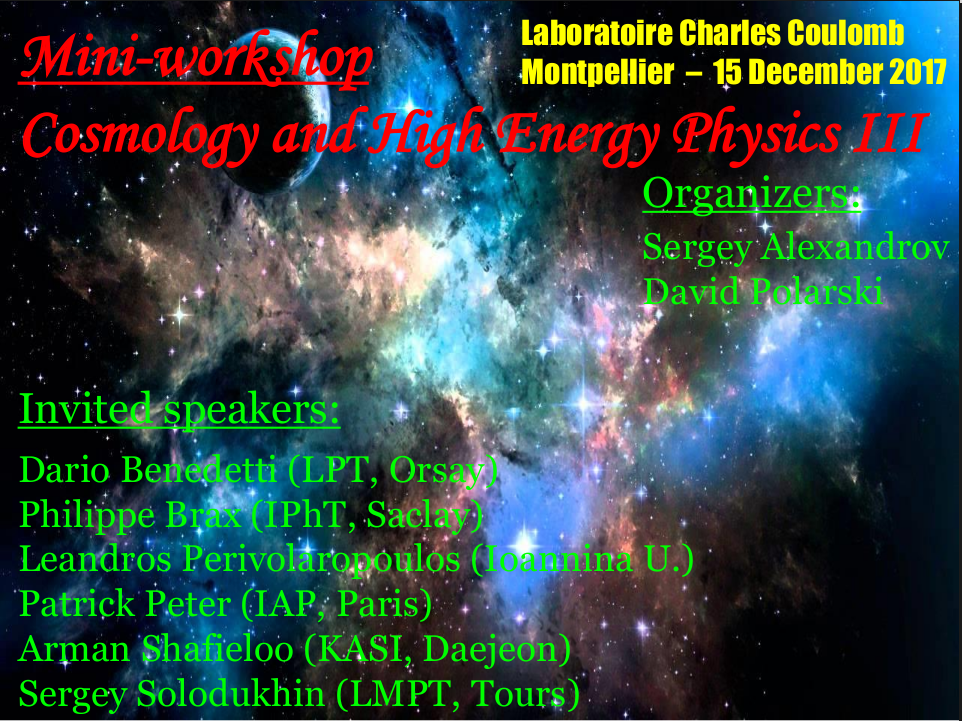Rechercher
Accueil > Evènements & Actualités > Conférences et colloques
Cosmology & High Energy Physics III
publié le , mis à jour le

Le Workshop "Cosmology and High Energy Physics III" se tiendra le 15 Décembre 2017 dans la Salle de la Grande Ourse du Laboratoire Charles Coulomb, au 1er Etg. du Bât 13.
Programme :
- 10:00 − 11:00 : Leandros Perivolaropoulos (Ioannina U.)
Hints for Modified Gravity in the Cosmos and in the Lab ?Abstract : Experimental and/or observational signals indicating possible violation of General Relativity can in principle emerge on various scales starting from sub-mm scales up to cosmological Gpc scales. Such signals include new forces on sub-mm scales that generalize the Newtonian force as well as the growth of cosmological perturbations on Mpc/Gpc scales that may indicate a redshift dependence of Newton’s constant. I review recent work searching for such signals in cosmological growth rate f σ8 data (RSD measurements) and in laboratory torsion balance data (Washington experiment). These studies indicate the presence of signals that are inconsistent with GR at the 2σ level. These signals may be due either to systematics in the analyzed data, or to large statistical fluctuations in the data or they may be early hints for violation of General Relativity. Focusing on the later possibility, I also briefly discuss specific theoretical models that may be consistent with these signals. Such models include infinite derivative (non-local) gravity and scalar tensor theories. A large part of the talk is based on the following recent papers (both published in Phys. Rev. D) : arXiv:1703.10538, arXiv:1611.07293.
- 11:00 − 12:00 : Dario Benedetti (LPT)
Asymptotic safety : a status reportAbstract : Asymptotic safety is a scenario of quantum gravity conjecturing that the ultraviolet behavior of gravity is governed by a non-trivial fixed point of the renormalization group, providing a self-completion of the effective field theory approach. In this talk I will review the basic ideas behind such scenario, the methods used to investigate it, and its applications to cosmology.
- 1200 − 1400 : Lunch
- 14:00 − 15:00 : Arman Shafieloo (KASI)
Beyond the concordance model of cosmologyAbstract : Standard model of cosmology, a spatially flat, homogeneous and isotropic universe with cosmological constant as dark energy, weakly interacting dark matter and power-law form of the primordial spectrum seems to agree with almost all cosmological observations. However, it is still a very important task in physical cosmology (and theoretical physics in general) to rigorously test different aspects of this model confronting it with observations. In my talk I discuss briefly about some of the advanced statistical methods of data analysis to robustly compare theory and observations and to prepare for the next generation of the cosmological surveys.
- 15:00 − 16:00 : Patrick Peter (IAP)
Ghost-induced instability in de Sitter backgroundAbstract : The perturbative instability of tensor perturbations in higher derivative gravity does not take place if the cosmological background is sufficiently mild, since in this case the situation is close to the free gravitational wave in flat space. I discuss the opposite situation and consider the effect of a de Sitter cosmological background with a large Hubble rate, typical of an inflationary period. It turns out that the instabilities are rapidly suppressed by the fast expansion of the universe. Finally, the instabilities generated by ghosts may arise only at the end of inflation, where the non-linear effects may completely change the situation.
- 16:00 − 16:30 : Coffee break
- 16:30 − 17:30 : Sergey Solodukhin (LMPT)
The quantum fate of black hole horizonsAbstract : I will discuss the possibility that in a complete quantum theory the black hole horizon is replaced by a wormhole whose parameters make it a perfect mimicker for a “true black hole”.
- 17:30 − 18:30 : Philippe Brax (IPhT)
R2 dark energy in the laboratoryAbstract : I will discuss the status of R2 gravity as a low energy dark energy model, possible embeddings in string inspired supergravity and laboratory prospects









